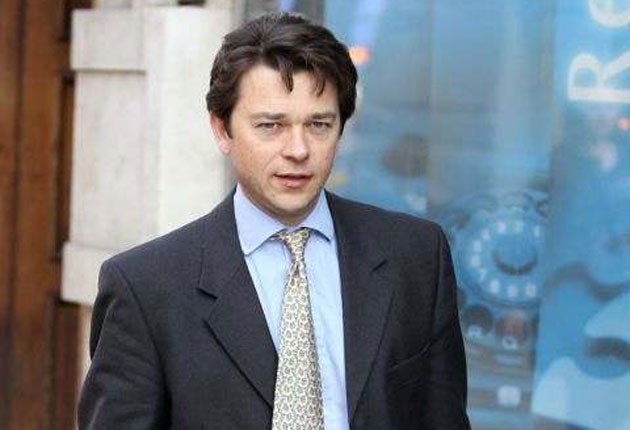Tim Nicholson: A green martyr
Sacked executive can argue he was discriminated against because of his belief in climate change, judge rules

Your support helps us to tell the story
From reproductive rights to climate change to Big Tech, The Independent is on the ground when the story is developing. Whether it's investigating the financials of Elon Musk's pro-Trump PAC or producing our latest documentary, 'The A Word', which shines a light on the American women fighting for reproductive rights, we know how important it is to parse out the facts from the messaging.
At such a critical moment in US history, we need reporters on the ground. Your donation allows us to keep sending journalists to speak to both sides of the story.
The Independent is trusted by Americans across the entire political spectrum. And unlike many other quality news outlets, we choose not to lock Americans out of our reporting and analysis with paywalls. We believe quality journalism should be available to everyone, paid for by those who can afford it.
Your support makes all the difference.An executive sacked from a giant property company can claim he was unfairly dismissed because of his "philosophical belief in climate change", a judge ruled yesterday.
In the first case of its kind, employment judge David Sneath said Tim Nicholson, a former environmental policy officer, could invoke employment law for protection from discrimination against him for his conviction that climate change was the world's most important environmental problem.
That conviction amounted to a philosophical belief under the Employment Equality (Religion and Belief) Regulations, 2003, the judge ruled on a point of law at a pre-hearing review of an employment tribunal in London.
Mr Nicholson, 41, had been head of sustainability at Grainger plc, Britain's biggest residential property investment company, until he was made redundant in July last year. He is now bringing a case for unfair dismissal, claiming that one of the reasons for his sacking was his strong belief about the importance of the environment – which put him at odds, he said, with other senior executives within the firm.
Grainger had good written policies both on the environment and corporate social responsibility, Mr Nicholson told the hearing – but there was a "mismatch" between the policies and the way in which the firm was managed. When he tried to get it to act in a more environmentally responsible way, he said, senior company executives obstructed him.
In a written statement submitted to the hearing, and then in oral evidence, Mr Nicholson listed a series of examples where, he said, Grainger's practices were very different from its proclaimed environmental stance. One of his jobs, he said, was to try to establish a carbon management strategy for the company – which had been listed as a target in the annual report and accounts. But when he tried to work out the firm's carbon footprint to implement it, senior staff from the human resources and financial departments refused him the necessary data.
Grainger's green policies would sometimes be shown to potential clients as part of a company package, he said, but the firm's executives would turn up at the meetings in "some of the most highly polluting cars on the road".
There was no control on how many flights people took, he said, so, "given the carbon intensity of flying", he raised his concerns with the company's chief executive, Rupert Dickinson, but never received a direct reply to his email. Eventually he was told by another member of staff that there would be no change to existing policy. In his written statement Mr Nicholson said: "He [Mr Dickinson] showed contempt for the need to cut carbon emissions by flying out a member of the IT staff to Ireland to deliver his BlackBerry that he had left behind in London."
Grainger had sought to have Mr Nicholson's attempt to use the Employment Equality (Religion and Belief) Regulations struck out. Counsel for the company, Harry Trory, contended at length that Mr Nicholson's views on climate change and the environment were based on fact and science, and did not constitute a philosophical belief. But the judge found in favour of Mr Nicholson. "In my judgment, his belief goes beyond a mere opinion, he said,
Mr Nicholson told the hearing that his green beliefs affected how he lived his life, "including my choice of home, how I travel, what I buy, what I eat and drink, what I do with my waste and my hopes and my fears".
He said: "For example, I no longer travel by airplane. I have eco-renovated my home. I try to buy local produce. I have reduced my consumption of meat. I compost my food waste.
"I encourage others to reduce their carbon emissions and I fear very much for the future of the human race, given the failure to reduce carbon emissions on a global scale."
Aged 41, and married with a small son, Mr Nicholson now works for a green medical charity in Oxford. He said after the hearing: "I am pleased with the result, and I hope this sets a predecent that will support anyone who shares my views on climate change and the environment."
The full employment tribunal is now set to take place from 4 June. Grainger might consider an appeal against yesterday's ruling, Mr Trory said.
Join our commenting forum
Join thought-provoking conversations, follow other Independent readers and see their replies
Comments